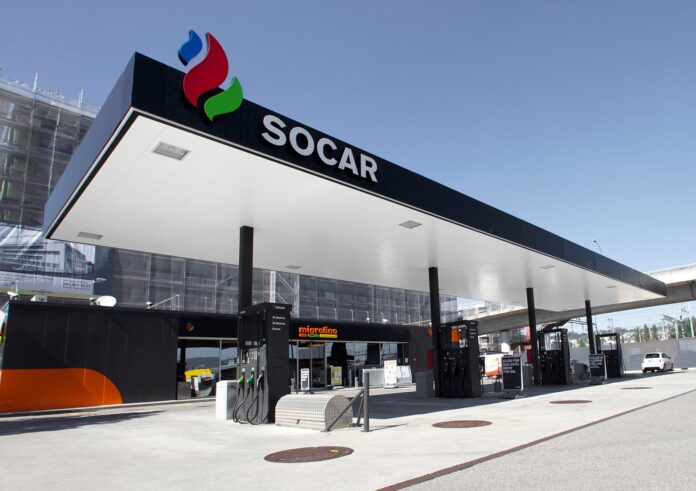ISLAMABAD:
The government has approved a framework for $280 million in Azerbaijani investment, opening the door for SOCAR to join Pakistan’s Machike-Thallian-Tarrujabba White Oil Pipeline (MTT-WOP).
According to industry sources, the government has paved the way for a long-awaited $280 million investment from Azerbaijan, clearing the path for the state-owned energy company SOCAR to take a stake in the Machike-Thallian-Tarrujabba White Oil Pipeline (MTT-WOP). The move follows months of negotiations and a conditional tariff approval by the Economic Coordination Committee (ECC) of the Cabinet.
Sources said the ECC endorsed the Petroleum Division’s proposals on tariff and regulatory arrangements, while clarifying that dollar-linked returns will only apply if foreign investment materializes. Under the deal, SOCAR is expected to invest around $280 million in the White Oil Pipeline, which is designed to transport petroleum products from central Punjab to Khyber Pakhtunkhwa.
The project has been on the agenda of both governments since Azerbaijani President Ilham Aliyev visited Pakistan in July 2024. SOCAR’s interest was confirmed during subsequent bilateral talks, including Prime Minister Shehbaz Sharif’s visit to Baku in February 2025. However, Baku set firm conditions, including a “ship-or-pay” guarantee requiring oil marketing companies (OMCs) in Pakistan to commit minimum annual volumes to the pipeline.
Frontier Works Organization (FWO) and Pakistan State Oil (PSO), operating through their joint venture Frontier Oil Company-I (FOC-I), submitted a revised tariff petition to the Oil and Gas Regulatory Authority (OGRA). The regulator provisionally approved the Machike-Thallian section, while the Thallian-Tarrujabba segment is still under review. The ECC’s approval now gives the regulator the mandate to finalize a commercial framework and enforce OMC commitments.
Key elements of the approved framework include a dollar-based tariff structure, which will only apply if foreign investment is secured, and a provision requiring OMCs to use the pipeline as the default transport mode for petroleum products. Any shortfall in committed volumes will be covered through the Inland Freight Equalisation Margin (IFEM), a mechanism that spreads costs across all OMCs nationwide.
While the Finance Division had earlier recommended changes such as extending the project’s payback period from four to seven years and lowering the weighted average cost of capital to prevent high early tariffs, the Petroleum Division resisted these amendments, warning they could discourage foreign investors. The ECC ultimately sided with the Petroleum Division’s approach, reflecting the strategic priority attached to attracting foreign capital.
During cabinet-level discussions, ministers emphasized the need to expand Pakistan’s pipeline infrastructure. At present, nearly 70% of petrol and diesel is transported by road, compared to 28% via pipelines and just 2% by rail. Expanding pipeline capacity, they argued, would lower transportation costs, reduce road congestion, and strengthen energy security.
The Power Minister, while supporting the project, cautioned that financial assumptions should be carefully scrutinized, citing past difficulties with independent power projects (IPPs) that locked Pakistan into long-term dollarized tariffs. Nonetheless, the ECC described the MTT-WOP as a “strategic investment opportunity” and noted that SOCAR’s entry into Pakistan could pave the way for further energy partnerships.
Industry sources also see the approval as a significant milestone, providing regulatory clarity that may encourage not just Azerbaijani participation but also interest from other international investors. OGRA has been tasked with finalizing commercial and technical details, ensuring that OMCs comply with volume commitments and that investment terms remain viable.
The project is expected to be transformative for Pakistan’s energy transport system, potentially shifting the balance away from road-based fuel supply chains. It also carries geopolitical significance, cementing energy ties between Pakistan and Azerbaijan, a country with vast oil and gas reserves seeking to diversify its overseas investments, said industry sources.
By approving the framework, Islamabad has demonstrated its willingness to adapt its tariff policies to foreign investor requirements, while linking dollar-based returns to the actual inflow of capital. This approach is designed to balance fiscal prudence with the need to attract strategic investment.
With the ECC’s approval in place, the next phase will involve direct negotiations with SOCAR to finalize investment terms. If successful, the White Oil Pipeline project could mark the beginning of deeper energy cooperation between Baku and Islamabad, with potential spillover benefits for Pakistan’s broader infrastructure and fuel logistics networks.
Sources also said that this decision has not only cleared the way for Azerbaijan’s investment but also signaled Pakistan’s broader commitment to upgrading its energy infrastructure. The outcome, they said, will depend on how quickly commercial terms can be finalized and whether SOCAR proceeds with its pledged investment.
As Pakistan moves to modernize its energy supply chain, the Machike-Thallian-Tarrujabba White Oil Pipeline could become a model for foreign-backed infrastructure projects, linking economic reforms to strategic partnerships. If realized, the $280 million Azerbaijani investment would represent one of the largest foreign direct investments in Pakistan’s energy sector in recent years.




